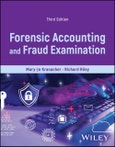In the newly revised third edition of Forensic Accounting and Fraud Examination, a team of renowned educators provides students and professionals alike with a comprehensive introduction to forensic accounting, fraud detection, and deterrence. Adhering to the model curriculum for education in fraud and forensic accounting funded by the US National Institute of Justice, this leading textbook offers real-world practicality supported by effective learning pedagogies and engaging case studies that bring technical concepts to life.
Covering every key step of the investigative process, Forensic Accounting and Fraud Examination contains 32 integrated IDEA and Tableau software cases that introduce students to the practical tools accounting professionals use to maximize auditing and analytic capabilities, detect fraud, and comply with documentation requirements. Numerous case summaries, “The Fraudster’s Perspective” boxes, and detailed discussions of a wide range of accounting issues provide students and practitioners with the tools they’ll need to successfully investigate, prosecute, research, and resolve forensic accounting issues and financial fraud.
The perfect resource for students of forensic accounting and fraud examination, as well as practitioners in the field, Forensic Accounting and Fraud Examination, Third Edition, will also prove invaluable for academics and researchers with an interest in the subject.
Table of Contents
Preface xii
About the Authors xiv
Section i Introduction to Forensic Accounting and Fraud Examination 1
1 Core Foundation Related to Forensic Accounting and Fraud Examination 3
2 Who Commits Fraud and Why: The Profile and Psychology of the Fraudster 48
3 Legal, Regulatory, and Professional Environment 74
Section ii Fraud Schemes 109
4 Cash Receipt Schemes and Other Asset Misappropriations 111
5 Cash Disbursement Schemes 142
6 Corruption and the Human Factor 193
7 Financial Statement Fraud 217
Section iii Detection and Investigative Tools and Techniques 257
8 Fraud Detection: Red Flags and Targeted Risk Assessment 259
9 Evidence-Based Fraud Examinations 287
10 Effective Interviewing and Interrogation 323
11 Using Information Technology for Fraud Examination and Financial Forensics 354
Section iv Advanced Topics in Forensic Accounting and Fraud Examination 377
12 Complex Frauds and Financial Crimes 379
13 Cybercrime: Fraud in a Digital World 410
14 Antifraud and Compliance Efforts: Ethics, Prevention, and Deterrence 433
Section v Litigation Advisory Services and Remediation 457
15 Consulting, Litigation Support, and Expert Witnessing: Damages, Valuations, and Other Engagements 459
16 Remediation and Litigation Advisory Services 518
Glossary 595
Index 599








